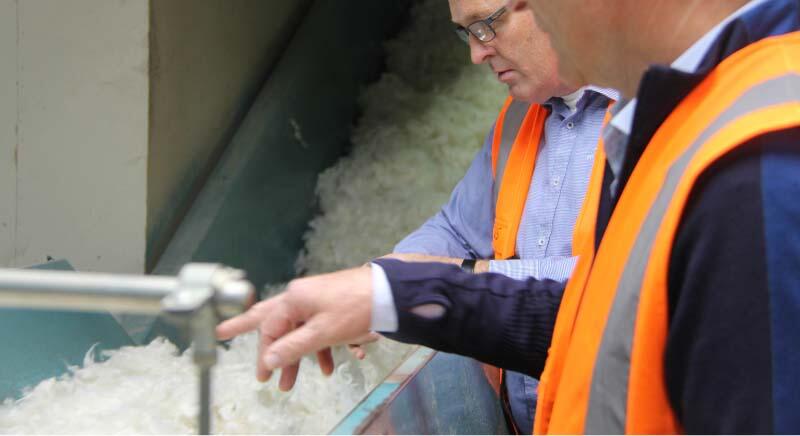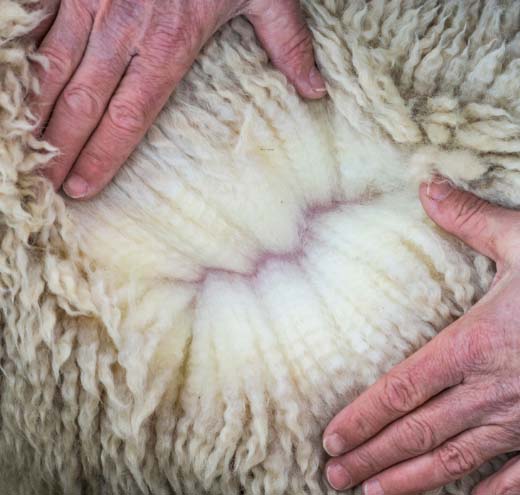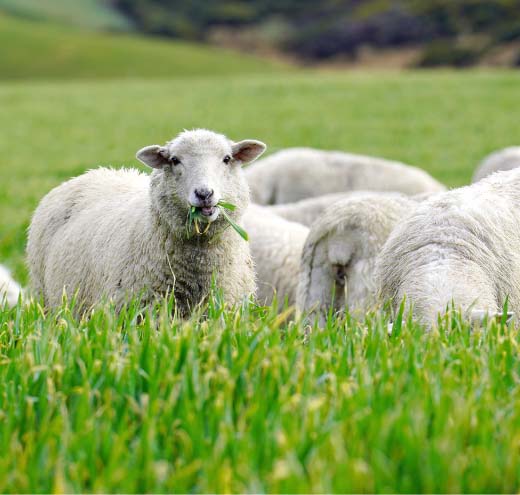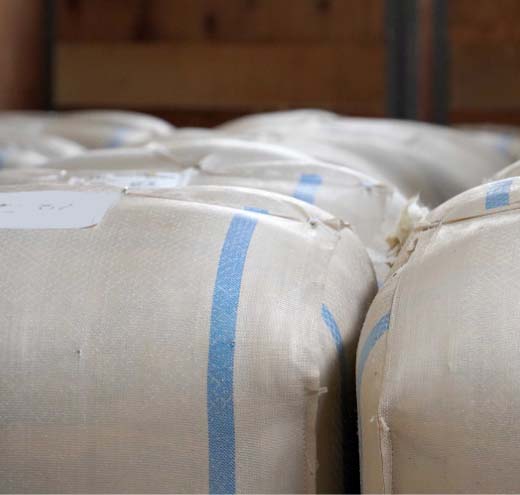Follow the Wool Integrity™ Journey
Wool Integrity™ provides traceability, animal welfare and quality assurance throughout the journey from the wool grower’s paddock to your product.
Growers in the programme are backed by a skilled team of Wool Representatives and benefit from forward contracts that guarantee price certainty, while manufacturers can rely on regular consignments that meet their specifications. The end user of any product marked with the Wool Integrity logo knows they are buying from brands that value the highest standards of animal welfare and quality.
Click on the steps below to explore each stage of the journey from the farm to the end product.

New Zealand wool growers are renowned the world over for their sheep farming abilities. Wool Integrity wool growers have gone the extra mile to be recognised for their dedication to a high standard of animal welfare and producing wool with superior qualities.
Only wool from growers that adhere to the requirements of the Wool Integrity Grower Declaration qualify for Wool Integrity certification. This assures the wool has been grown to industry best practice standards under strict animal welfare regulations, which are independently audited. Wool Integrity has guaranteed non-mulesed fibre since its inception in 2015, and New Zealand became the first country to ban this practice in 2018.
As part of Wool Integrity compliance and to ensure standards are continually met, farms are independently audited through the NZFAP programme by QCONZ, which is JAS-ANZ and ISO certified.
PGG Wrightson Wool handles and markets a significant volume of the New Zealand wool clip every year through four stores located in Napier, Christchurch, Mosgiel, and Invercargill. When Wool Integrity fibre arrives at our wool stores it follows a thorough sorting and testing process with records kept against every farm lot.
A sample of each lot is mechanically drawn and inspected by in-house experts to determine its quality and suitability. Each farm lot is then independently sampled and tested by NZWTA or SGS Wool Testing Services. Any deviation on specification is rejected from a consignment, ensuring fibre supplied is fit for its end purpose.
Wool is fully traceable back to its originating farm with the use of robust systems and record-keeping throughout the process.
Wool straight from the farm contains high levels of lanolin, a naturally occurring grease secreted by the sheep that is a useful ingredient for skincare products and some industrial applications. Sheep also gather soil, seeds, twigs and grass as they roam around their environment which all need to be removed from the fleece, depending on the end product. This is done by a process called scouring.
Wool Integrity fibre is scoured in New Zealand before heading offshore for manufacturing. Our scouring partner uses environmentally conscious detergents to clean the wool, and no bleach or other chemical enhancements are applied to the fibre in the process. Following scouring, the fibre is independently tested a second time for quality assurance.
Watch the video below for a glimpse into the scouring process at our scouring partner Woolworks’ facility.
Wool Integrity links the right growers with the right manufacturers, supplying wool that meets their specifications and negotiating short or long term supply orders depending on requirements.
Once the right fibre for the end product is selected, export to the manufacturer is coordinated by Bloch & Behrens, international sales and marketing division of PGG Wrightson Wool. Bloch & Behrens was established in Denmark in 1856 and opened an office in New Zealand in 1949. It has been supplying local New Zealand mills and exporting New Zealand wool to the world ever since.
Bloch & Behrens is highly experienced in exporting New Zealand wool to the world, with a guarantee that quality fit-for-purpose wool is delivered every time.
Wool is a multifunctional fibre with many benefits that lend it to endless applications. These different end uses require different fibre specifications and have different steps along the manufacturing journey. Common processes required to create woollen products include:
Carding
During the carding process, wool fibres pass through metal teeth that straighten and blend the lengths into slivers. Carding also removes any residual dirt and other matter left in the fibres after the scouring process. Carded wool can then be spun, and is ideal for woollen yarn.
Spinning
The spinning stage uses carded slivers and spins the fibres to form thread or yarn. Spinning for the purpose of woollen yarns typically takes place on a mule spinning machine, while worsted yarns can be spun on any number of spinning machines and placed on drums or cones, ready for weaving or knitting.
Weaving and Knitting
Commercial fabrics can be made using industrial weaving looms and knitting machines. Fabric can then be cut and sewn into clothing, upholstery, home accessories and footwear. Some weaving and knitting machines create finished products such as blankets and 3D knitted garments.
Non-woven Materials
Woollen non-woven materials aren’t made using yarn, instead the fibre is felted or bonded together to form a dense fabric or material. There are many applications for non-woven wool including acoustic and thermal insulation or panels, protective packaging, upholstery and mattress fill, fire protection products and even horticultural weed matting.
Finishing
Depending on the end product, after being woven, knitted or bonded into a useable material, there may be extra steps in the manufacturing process. Browse the videos below to see different manufacturing processes that Wool Integrity fibre goes through.
Products that carry the Wool Integrity logo provide the end user with assurances about the wool’s origin in New Zealand, the strict animal welfare standards adhered to, and gives them confidence that their product is made with superior quality fibre.

Learn About Wool
Discover Wool Benefits
Animal Welfare
View Animal Welfare Standards